Sir John Monash, Personal Files Book 16, 3 September - 9 October 1917, Part 19
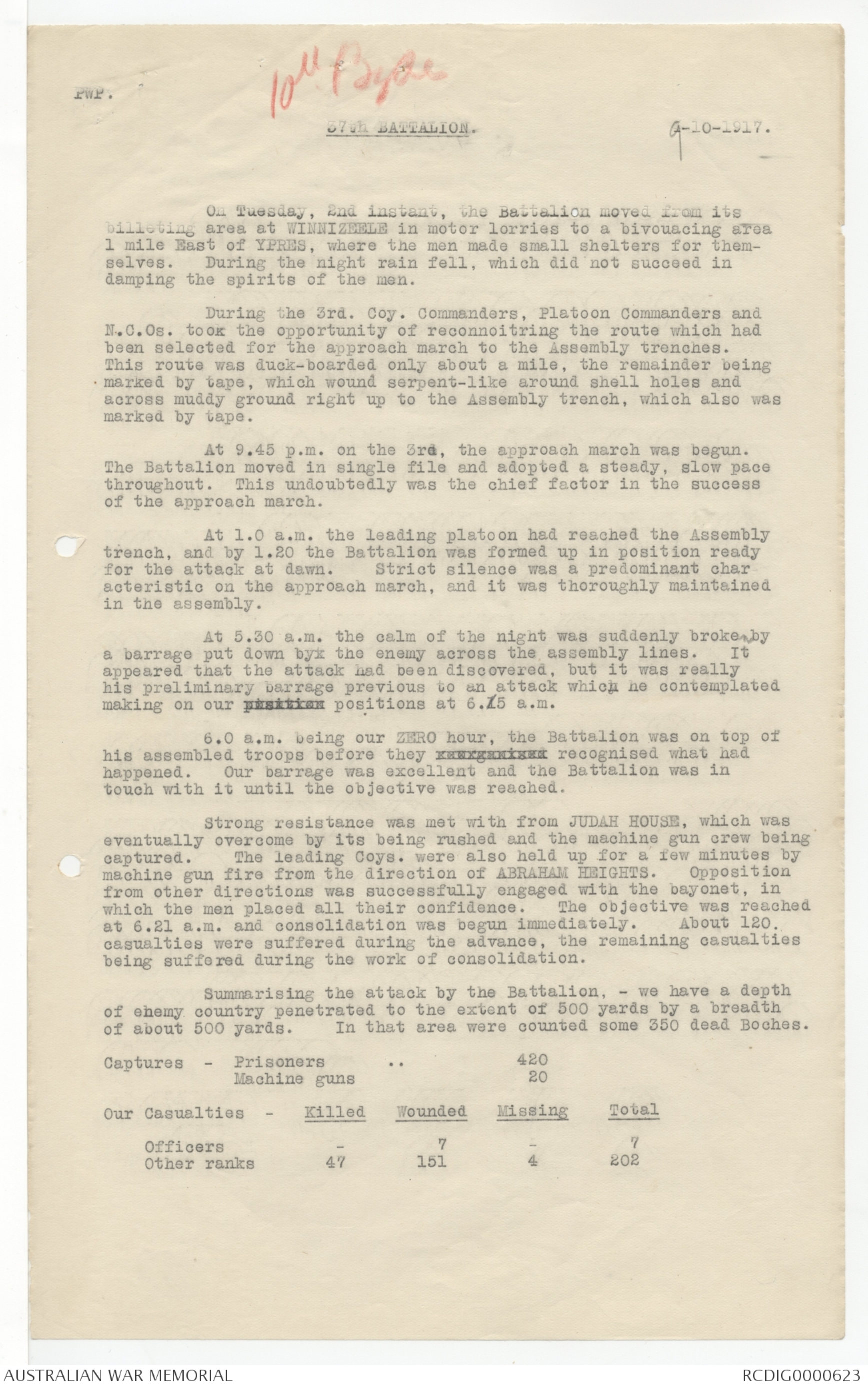
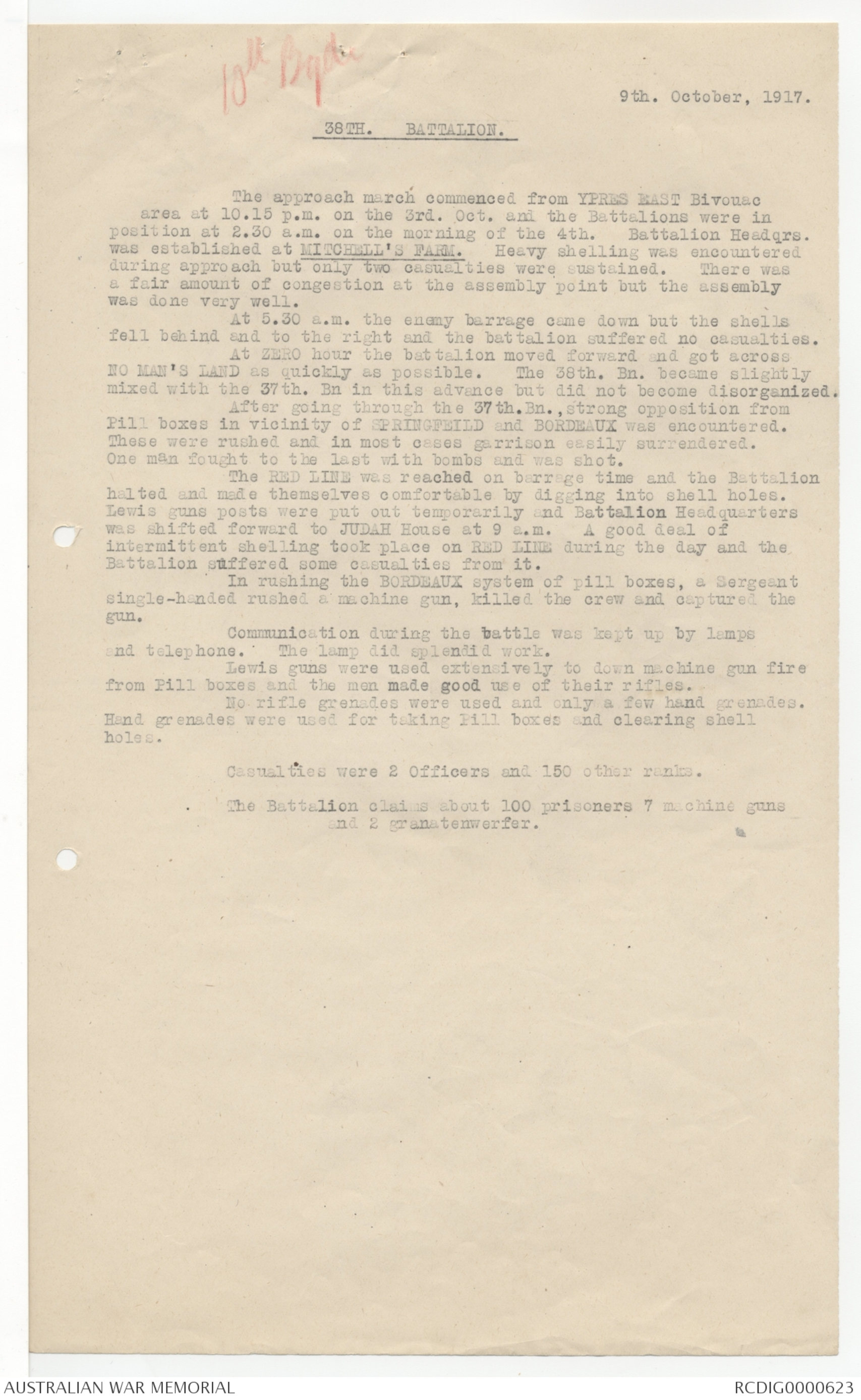
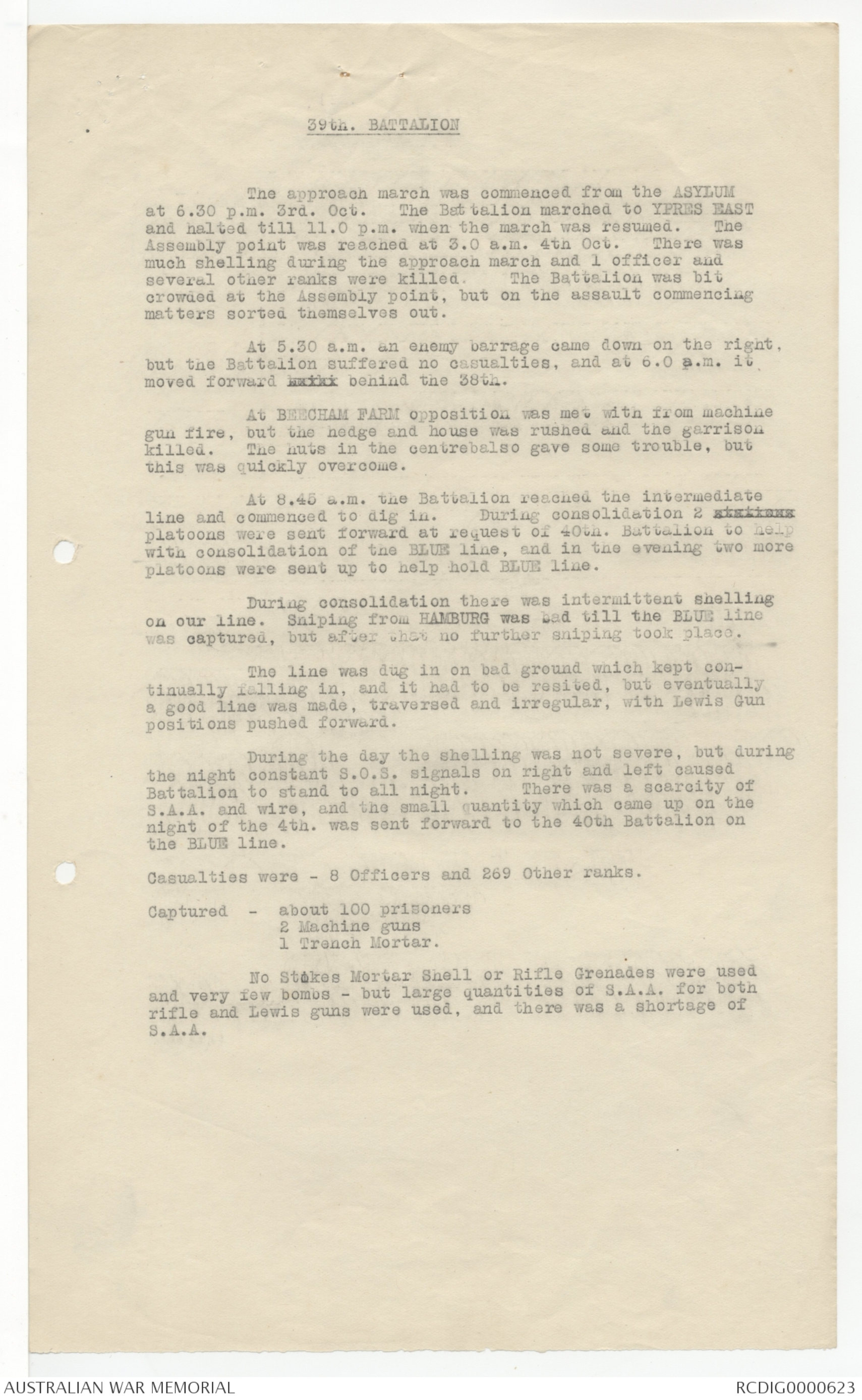
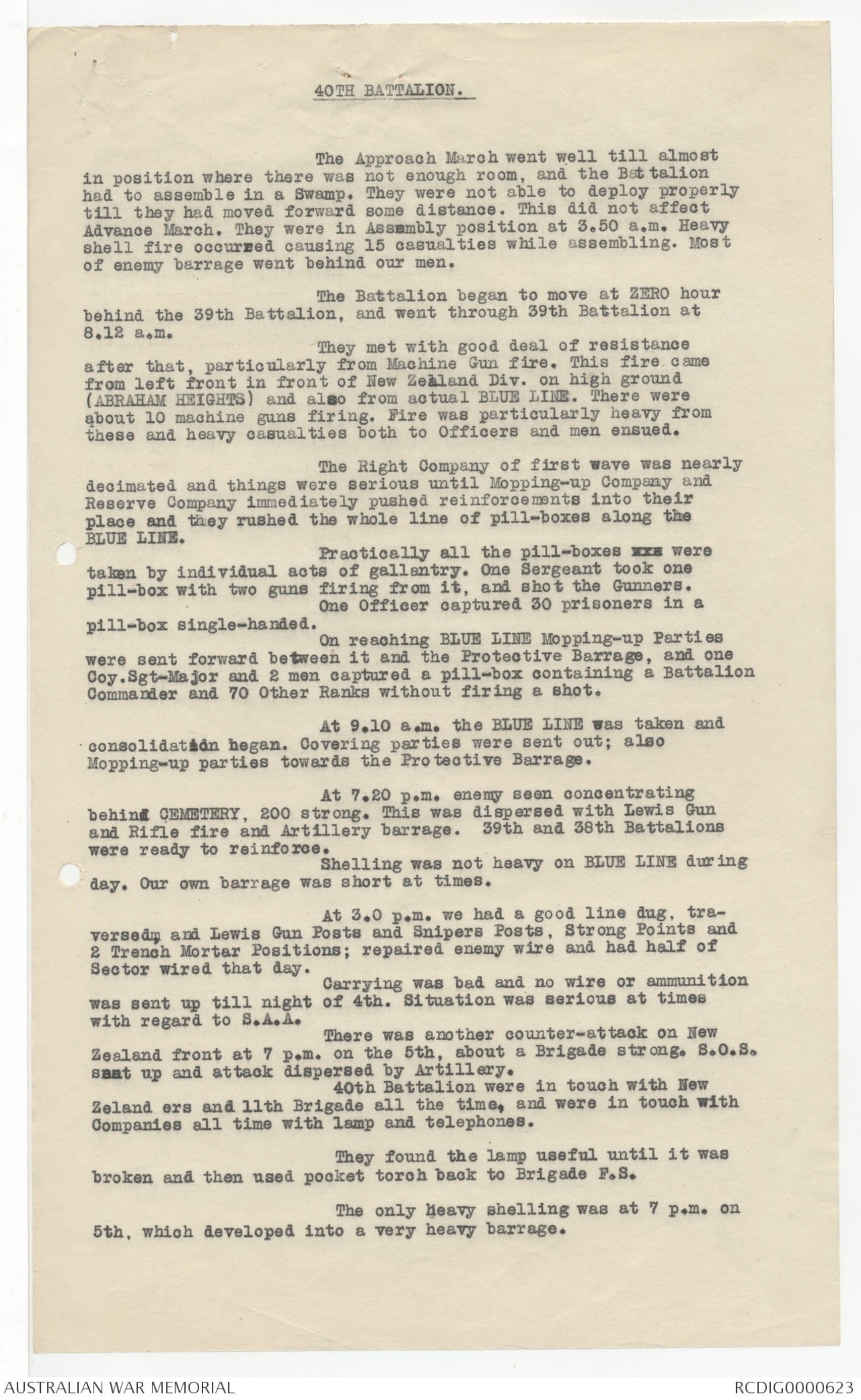

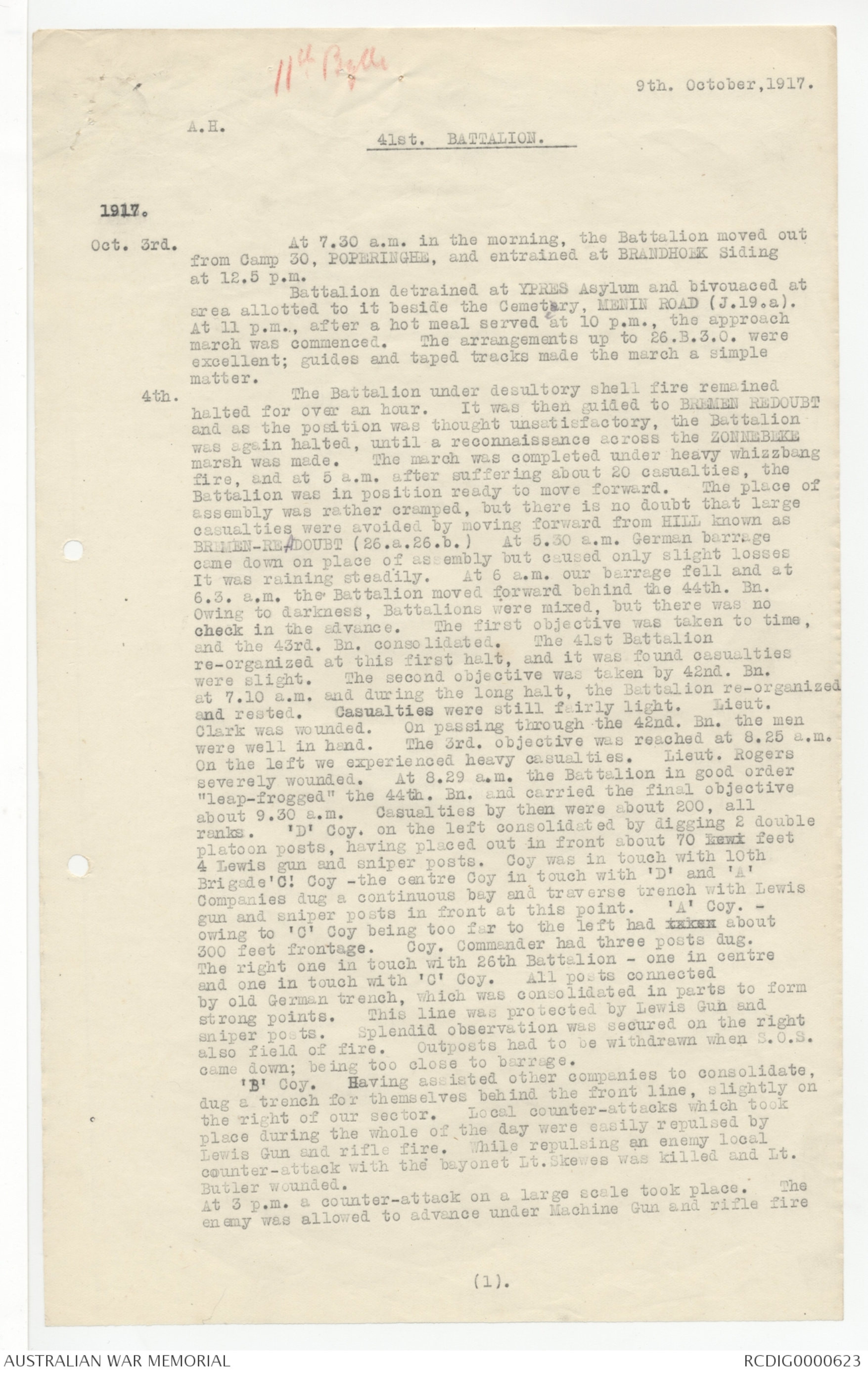
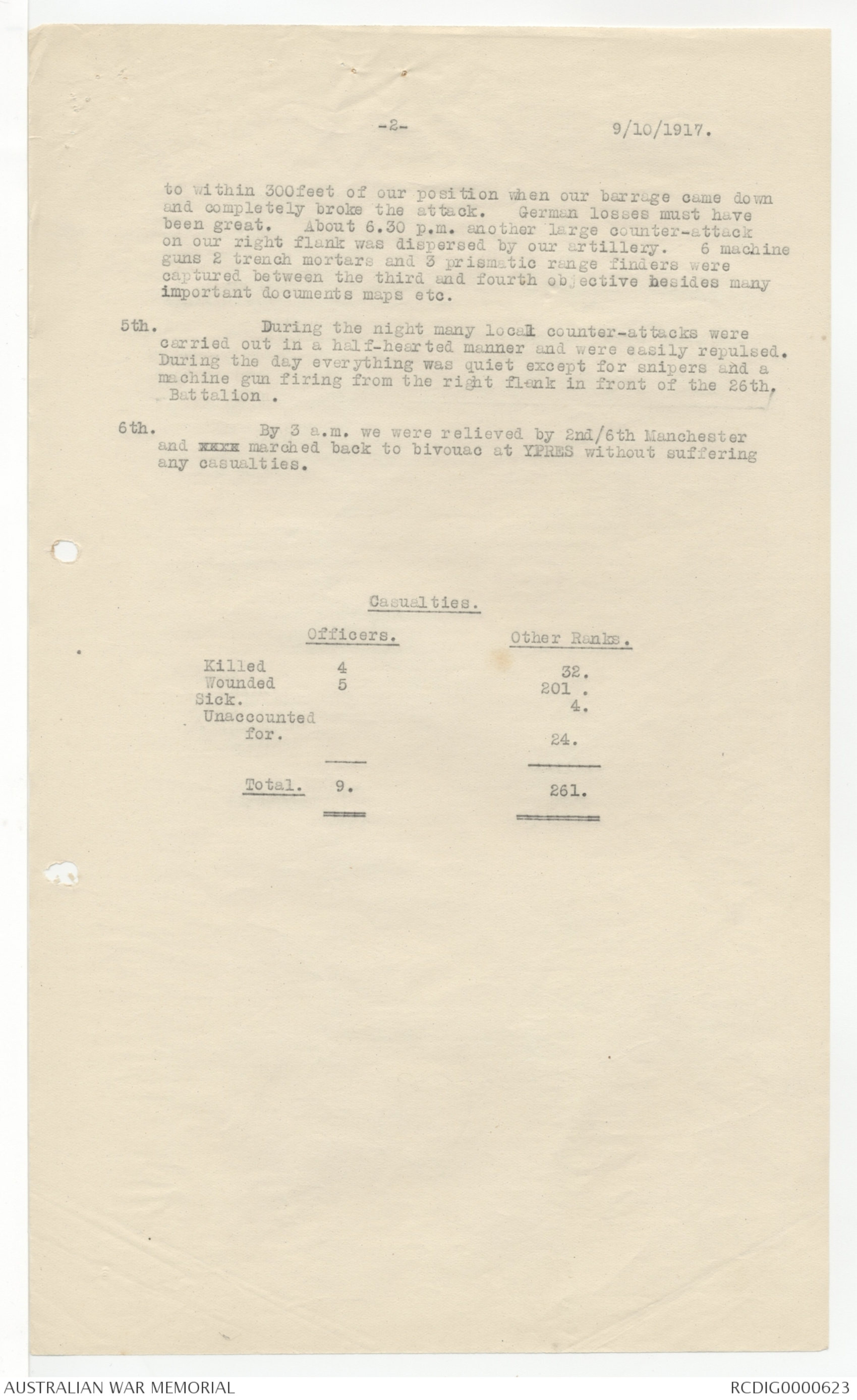
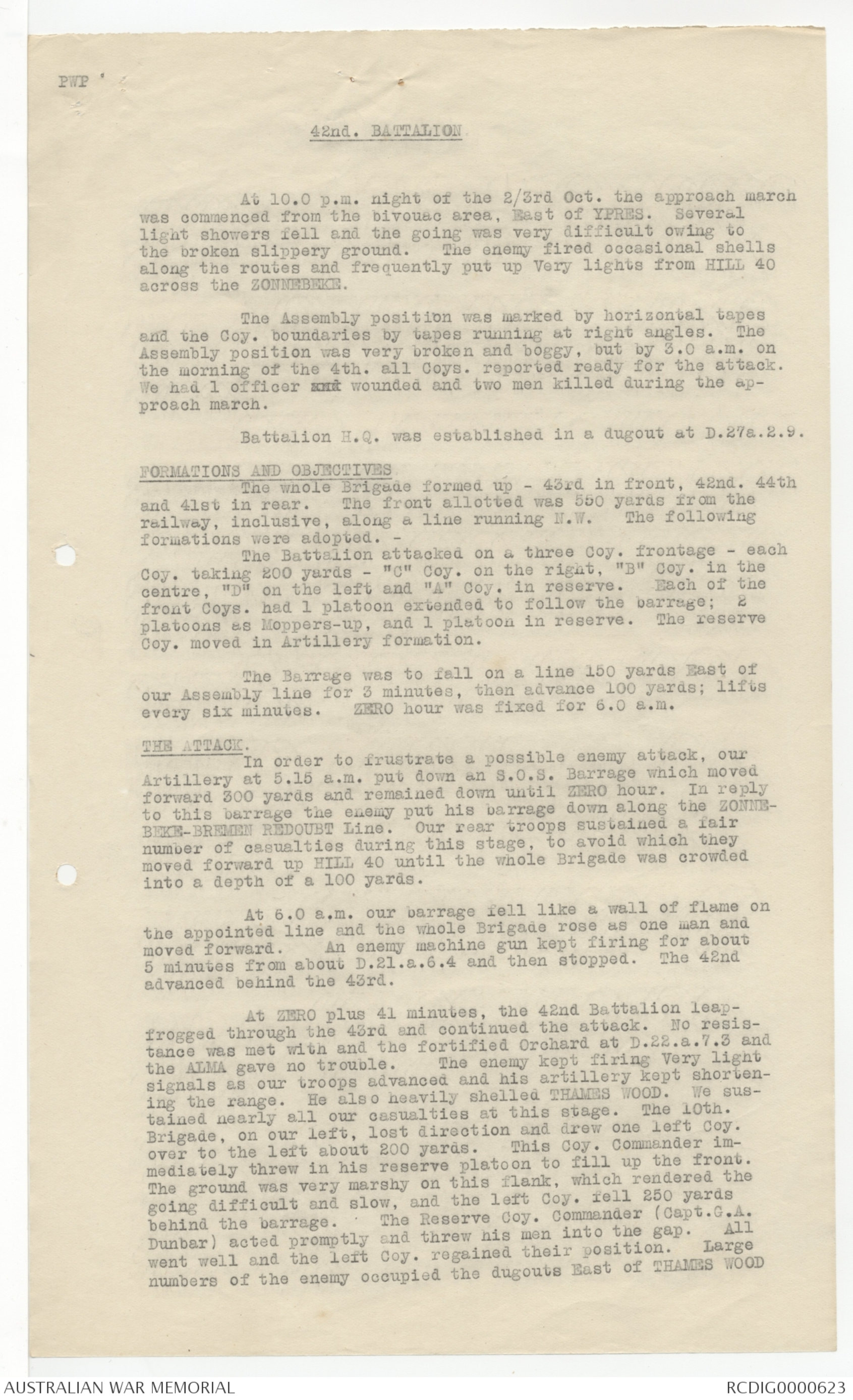
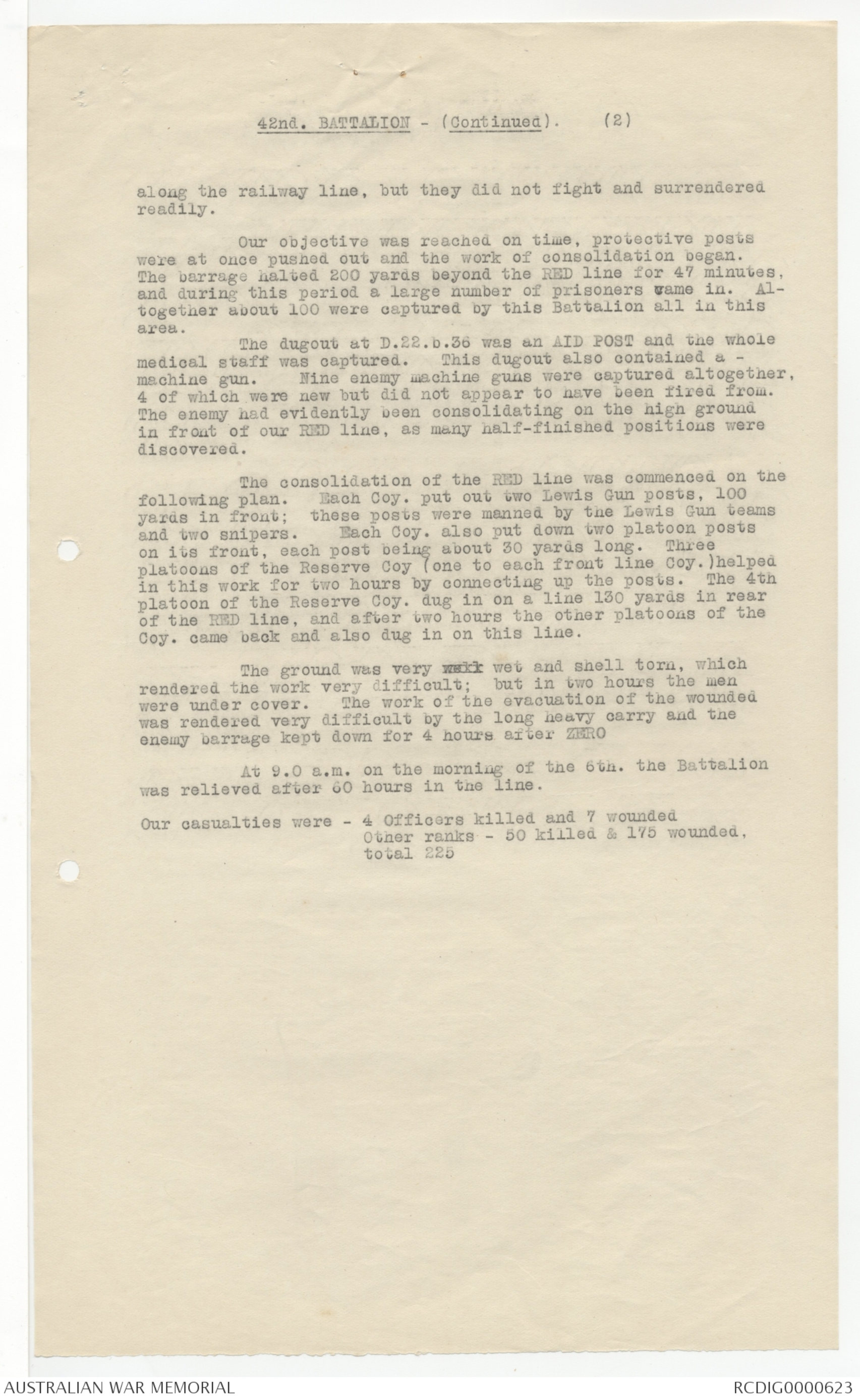
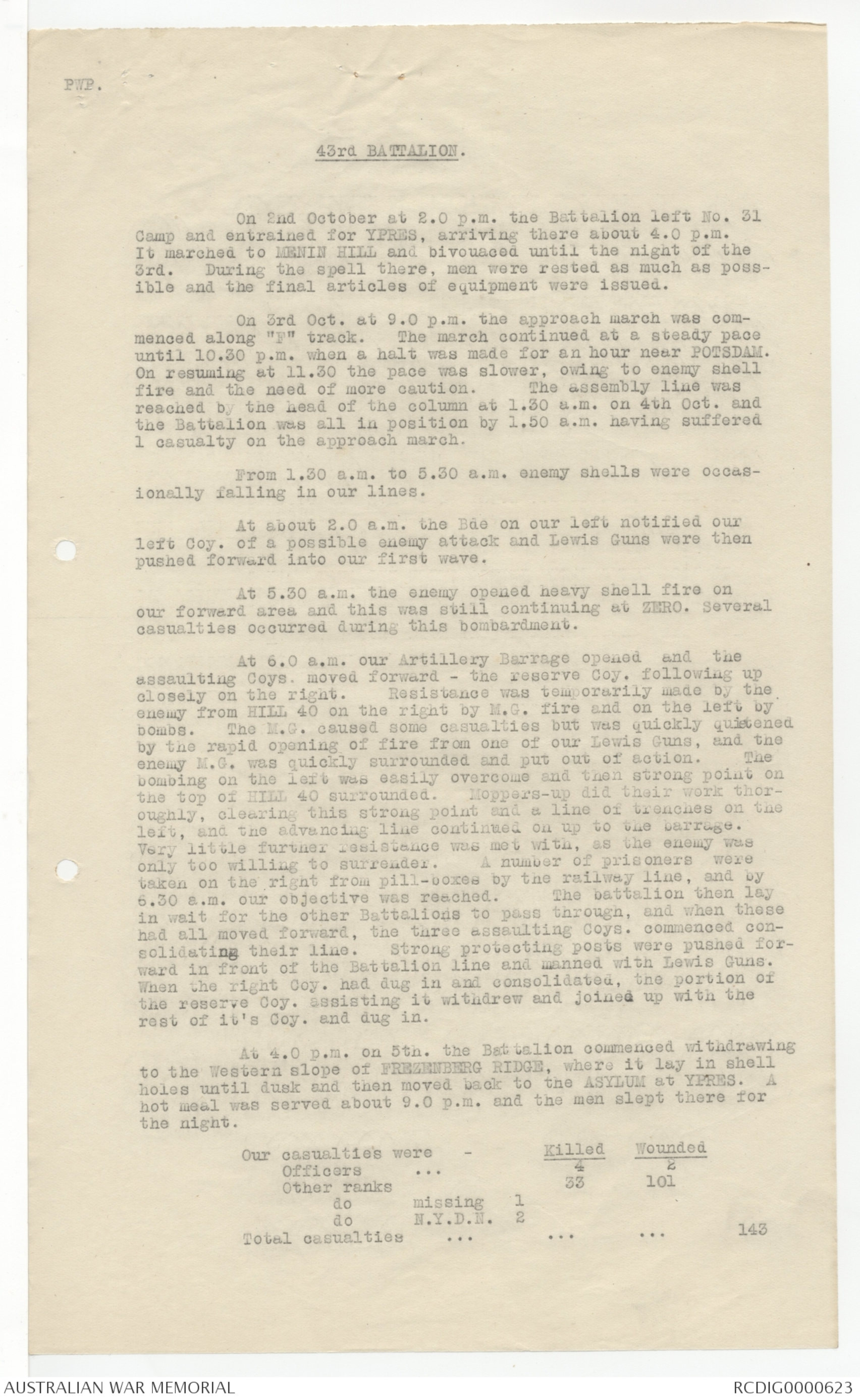
PWP.
[*10th Bgde*]
9-10-1917.
37th BATTALION.
On Tuesday, 2nd instant, the Battalion moved from its
billeting area at WINNIZEELE in motor lorries to a bivouacing area
1 mile East of YPRES, where the men made small shelters for
themselves. During the night rain fell, which did not succeed in
damping the spirits of the men.
During the 3rd. Coy. Commanders, Platoon Commanders and
N.C.Os. took the opportunity of reconnoitring the route which had
been selected for the approach march to the Assembly trenches.
This route was duck-boarded only about a mile, the remainder being
marked by tape, which wound serpent-like around shell holes and
across muddy ground right up to the Assembly trench, which also was
marked by tape.
At 9.45 p.m. on the 3rd, the approach march was begun.
The Battalion moved in single file and adopted a steady, slow pace
throughout. This undoubtedly was the chief factor in the success
of the approach march.
At 1.0 a.m. the leading platoon had reached the Assembly
trench, and by 1.20 the Battalion was formed up in position ready
for the attack at dawn. Strict silence was a predominant
characteristic on the approach march, and it was thoroughly maintained
in the assembly.
At 5.30 a.m. the calm of the night was suddenly broken by
a barrage put down byx the enemy across the assembly lines. It
appeared that the attack had been discovered, but it was really
his preliminary barrage previous to an attack which he contemplated
making on our xxxxxxxx positions at 6.15 a.m.
6.0 a.m. being our ZERO hour, the Battalion was on top of
his assembled troops before they xxxxxxx recognised what had
happened. Our barrage was excellent and the Battalion was in
touch with it until the objective was reached.
Strong resistance was met with from JUDAH HOUSE, which was
eventually overcome by its being rushed and the machine gun crew being
captured. The leading Coys. were also held up for a few minutes by
machine gun fire from the direction of ABRAHAM HEIGHTS. Opposition
from other directions was successfully engaged with the bayonet, in
which the men placed all their confidence. The objective was reached
at 6.21 a.m. and consolidation was begun immediately. About 120.
casualties were suffered during the advance, the remaining casualties
being suffered during the work of consolidation.
Summarising the attack by the Battalion, - we have a depth
of enemy country penetrated to the extent of 500 yards by a breadth
of about 500 yards. In that area were counted some 350 dead Boches.
Captures - Prisoners .. 420
Machine guns 20
Our Casualties -
Killed Wounded Missing Total
Officers - 7 - 7
Other ranks 47 151 4 202
[*10th Bgde*]
9th. October, 1917.
38TH. BATTALION.
The approach march commenced from YPRES EAST Bivouac
area at 10.15 p.m. on the 3rd. Oct. and the Battalions were in
position at 2.30 a.m. on the morning of the 4th. Battalion Headqrs.
was established at MITCHELL'S FARM. Heavy shelling was encountered
during approach but only two casualties were sustained. There was
a fair amount of congestion at the assembly point but the assembly
was done very well.
At 5.30 a.m. the enemy barrage came down but the shells
fell behind and to the right and the battalion suffered no casualties.
At ZERO hour the battalion moved forward and got across
NO MAN'S LAND as quickly as possible. The 38th. Bn. became slightly
mixed with the 37th. Bn in this advance but did not become disorganized.
After going through the 37th. Bn., strong opposition from
Pill boxes in vicinity of SPRINGFEILD and BORDEAUX was encountered.
These were rushed and in most cases garrison easily surrendered.
One man fought to the last with bombs and was shot.
The RED LINE was reached on barrage time and the Battalion
halted and made themselves comfortable by digging into shell holes.
Lewis guns posts were put out temporarily and Battalion Headquarters
was shifted forward to JUDAH House at 9 a.m. A good deal of
intermittent shelling took place on RED LINE during the day and the
Battalion suffered some casualties from it.
In rushing the BORDEAUX system of pill boxes, a Sergeant
single-handed rushed a machine gun, killed the crew and captured the
gun.
Communication during the battle was kept up by lamps
and telephone. The lamp did splendid work.
Lewis guns were used extensively to down machine gun fire
from Pill boxes and the men made good use of their rifles.
No rifle grenades were used and only a few hand grenades.
Hand grenades were used for taking Pill boxes and clearing shell
holes.
Casualties were 2 Officers and 150 other ranks.
The Battalion claims about 100 prisoners 7 machine guns
and 2 granatenwerfer.
39th. BATTALION
The approach march was commenced from the ASYLUM
at 6.30 p.m. 3rd. Oct. The Battalion marched to YPRES EAST
and halted till 11.0 p.m. when the march was resumed. The
Assembly point was reached at 3.0 a.m. 4th Oct. There was
much shelling during the approach march and 1 officer and
several other ranks were killed. The Battalion was bit
crowded at the Assembly point, but on the assault commencing
matters sorted themselves out.
At 5.30 a.m. an enemy barrage came down on the right,
but the Battalion suffered no casualties, and at 6.0 a.m. it
moved forward xxxxxx behind the 38th.
At BEECHAM FARM opposition was met with from machine
gun fire, but the hedge and house was rushed and the garrison
killed. The huts in the centrebalso gave some trouble, but
this was quickly overcome.
At 8.45 a.m. the Battalion reached the intermediate
line and commenced to dig in. During consolidation 2 xxxxxx
platoons were sent forward at request of 40th. Battalion to help
with consolidation of the BLUE line, and in the evening two more
platoons were sent up to help hold BLUE line.
During consolidation there was intermittent shelling
on our line. Sniping from HAMBURG was bad till the BLUE line
was captured, but after that no further sniping took place.
The line was dug in on bad ground which kept continually
falling in, and it had to be resited, but eventually
a good line was made, traversed and irregular, with Lewis Gun
positions pushed forward.
During the day the shelling was not severe, but during
the night constant S.O.S. signals on right and left caused
Battalion to stand to all night. There was a scarcity of
S.A.A. and wire, and the small quantity which came up on the
night of the 4th, was sent forward to the 40th Battalion on
the BLUE line.
Casualties were - 8 Officers and 269 Other ranks.
Captured - about 100 prisoners
2 Machine guns
1 Trench Mortar.
No Stokes Mortar Shell or Rifle Grenades were used
and very few bombs - but large quantities of S.A.A. for both
rifle and Lewis guns were used, and there was a shortage of
S.A.A.
4OTH BATTALION.
The Approach March went well till almost
in position where there was not enough room, and the Battalion
had to assemble in a Swamp. They were not able to deploy properly
till they had moved forward some distance. This did not affect
Advance March. They were in Assembly position at 3.50 a.m. Heavy
shell fire occurred causing 15 casualties while assembling. Most
of enemy barrage went behind our men.
The Battalion began to move at ZER0 hour
behind the 39th Battalion, and went through 39th Battalion at
8.12 a.m.
They met with good deal of resistance
after that, particularly from Machine Gun fire. This fire came
from left front in front of New Zealand Div. on high ground
(ABRAHAM HEIGHTS) and also from actual BLUE LINE. There were
about 10 machine guns firing. Fire was particularly heavy from
these and heavy casualties both to Officers and men ensued.
The Right Company of first wave was nearly
decimated and things were serious until Mopping-up Company and
Reserve Company immediately pushed reinforcements into their
place and they rushed the whole line of pill-boxes along the
BLUE LINE.
Practically all the pill-boxes xxxxx were
taken by individual acts of gallantry. One Sergeant took one
pill-box with two guns firing from it, and shot the Gunners.
One Officer captured 30 prisoners in a
pill-box single-handed.
On reaching BLUE LINE Mopping-up Parties
were sent forward between it and the Protective Barrage, and one
Coy. Sgt-Major and 2 men captured a pill-box containing a Battalion
Commander and 70 Other Ranks without firing a shot.
At 9.10 a.m. the BLUE LINE was taken and
consolidation began. Covering parties were sent out; also
Mopping-up parties towards the Protective Barrage.
At 7.20 p.m. enemy seen concentrating
behind CEMETERY, 200 strong. This was dispersed with Lewis Gun
and Rifle fire and Artillery barrage. 39th and 38th Battalions
were ready to reinforce.
Shelling was not heavy on BLUE LINE during
day. Our own barrage was short at times.
At 3.0 p.m. we had a good line dug, traversed,
and Lewis Gun Posts and Snipers Posts, Strong Points and
2 Trench Mortar Positions; repaired enemy wire and had half of
Sector wired that day.
Carrying was bad and no wire or ammunition
was sent up till night of 4th. Situation was serious at times
with regard to S.A.A.
There was another counter-attack on New
Zealand front at 7 p.m. on the 5th, about a Brigade strong. S.O.S.
sent up and attack dispersed by Artillery.
40th Battalion were in touch with New
Zeland ers and 11th Brigade all the time, and were in touch with
Companies all time with lamp and telephones.
They found the lamp useful until it was
broken and then used pocket torch back to Brigade F.S.
The only heavy shelling was at 7 p.m. on
5th, which developed into a very heavy barrage.
-2-
Battalion was relieved by 7th Manchester Regt.,
199th Brigade, at 9.30 p.m.
The enemy was moving back his guns from 9 a.m.
till noon on 5th instant and then started to register.
Enemy aircraft was active on morning of 5th
instant at daybreak, but none of ours were about.
Three enemy Machine Guns were effectively used
against the enemy, there being an abundance of ammunition.
Casualties of 40th Battalion.
7 Officers. 260 Other Ranks.
Captures.
Prisoners. 300.
M.Gs. 13.
T.Ms. 3.
1 Listening Set.
1 Wireless Set, including Dynamo.
2 7.7 cm. guns were seen to be abandoned
in front of the line.
[*11th Bgde*]
9th. October, 1917.
A.H.
41st. BATTALION.
1917.
Oct 3rd. At 7.30 a.m. in the morning, the Battalion moved out
from Camp 30, POPERINGHE, and entrained at BRANDHOEK Siding
at 12.5 p.m.
Battalion detrained at YPRES Asylum and bivouaced at
area allotted to it beside the Cemetery, MENIN ROAD (J.19.a).
At 11 p.m., after a hot meal served at 10 p.m., the approach
march was commenced. The arrangements up to 26.B.3.0. were
excellent; guides and taped tracks made the march a simple
matter.
4th. The Battalion under desultory shell fire remained
halted for over an hour. It was then guided to BREMEN REDOUBT
and as the position was thought unsatisfactory, the Battalion
was again halted, until a reconnaissance across the ZONNEBEKE
marsh was made. The march was completed under heavy whizzbang
fire, and at 5 a.m. after suffering about 20 casualties, the
Battalion was in position ready to move forward. The place of
assembly was rather cramped, but there is no doubt that large
casualties were avoided by moving forward from HILL known as
BREMEN-REDOUBT (26.a.26.b.) At 5.30 a.m. German barrage
came down on place of assembly but caused only slight losses
It was raining steadily. At 6 a.m. our barrage fell and at
6.3. a.m. the Battalion moved forward behind the 44th. Bn.
Owing to darkness, Battalions were mixed, but there was no
check in the advance. The first objective was taken to time,
and the 43rd. Bn. consolidated. The 4lst Battalion
re-organized at this first halt, and it was found casualties
were slight. The second objective was taken by 42nd. Bn.
at 7.10 a.m. and during the long halt, the Battalion re-organized
and rested. Casualties were still fairly light. Lieut.
Clark was wounded. On passing through the 42nd. Bn. the men
were well in hand. The 3rd. objective was reached at 8.25 a.m.
On the left we experienced heavy casualties. Lieut. Rogers
severely wounded. At 8.29 a.m. the Battalion in good order
"leap-frogged" the 44th. Bn. and carried the final objective
about 9.30 a.m. Casualties by then were about 200, all
ranks. 'D' Coy. on the left consolidated by digging 2 double
platoon posts, having placed out in front about 70 xxxx feet
4 Lewis gun and sniper posts. Coy was in touch with 10th
Brigade' C! Coy -the centre Coy in touch with 'D' and 'A'
Companies dug a continuous bay and traverse trench with Lewis
gun and sniper posts in front at this point. 'A' Coy. -
owing to 'C' Coy being too far to the left had xxxxx about
300 feet frontage. Coy. Commander had three posts dug.
The right one in touch with 26th Battalion - one in centre
and one in touch with 'C' Coy. All posts connected
by old German trench, which was consolidated in parts to form
strong points. This line was protected by Lewis Gun and
sniper posts. Splendid observation was secured on the right
also field of fire. Outposts had to be withdrawn when S.O.S.
came down; being too close to barrage.
'B' Coy. Having assisted other companies to consolidate,
dug a trench for themselves behind the front line, slightly on
the right of our sector. Local counter-attacks which took
place during the whole of the day were easily repulsed by
Lewis Gun and rifle fire. While repulsing an enemy local
counter-attack with the bayonet Lt. Skewes was killed and Lt.
Butler wounded.
At 3 p.m. a counter-attack on a large scale took place. The
enemy was allowed to advance under Machine Gun and rifle fire
(1).
-2-
9/10/1917.
to within 300 feet of our position when our barrage came down
and completely broke the attack. German losses must have
been great. About 6.30 p.m. another large counter-attack
on our right flank was dispersed by our artillery. 6 machine
guns 2 trench mortars and 3 prismatic range finders were
captured between the third and fourth objective besides many
important documents maps etc.
5th. During the night many local counter-attacks were
carried out in a half-hearted manner and were easily repulsed.
During the day everything was quiet except for snipers and a
machine gun firing from the right flank in front of the 26th.
Battalion.
6th. By 3 a.m. we were relieved by 2nd/6th Manchester
and xxxxx marched back to bivouac at YPRES without suffering
any casualties.
Casualties.
Officers. Other Ranks.
Killed 4 32.
Wounded 5 201.
Sick. 4.
Unaccounted
for. 24.
____ ____
Total. 9. 261.
____ ____
PWP
42nd. BATTALION
At 10.0 p.m. night of the 2/3rd Oct. the approach march
was commenced from the bivouac area, East of YPRES. Several
light showers fell and the going was very difficult owing to
the broken slippery ground. The enemy fired occasional shells
along the routes and frequently put up Very lights from HILL 40
across the ZONNEBEKE.
The Assembly position was marked by horizontal tapes
and the Coy. boundaries by tapes running at right angles. The
Assembly position was very broken and boggy, but by 3.0 a.m. on
the morning of the 4th. all Coys. reported ready for the attack.
We had 1 officer and wounded and two men killed during the
approach march.
Battalion H.Q. was established in a dugout at D.27a.2.9.
FORMATIONS AND OBJECTIVES
The whole Brigade formed up - 43rd in front, 42nd. 44th
and 4lst in rear. The front allotted was 550 yards from the
railway, inclusive, along a line running N.W. The following
formations were adopted. -
The Battalion attacked on a three Coy. frontage - each
Coy, taking 200 yards - "C" Coy. on the right, "B" Coy. in the
centre, "D" on the left and "A” Coy. in reserve. Each of the
front Coys. had 1 platoon extended to follow the barrage; 2
platoons as Moppers-up, and 1 platoon in reserve. The reserve
Coy. moved in Artillery formation.
The Barrage was to fall on a line 150 yards East of
our Assembly line for 3 minutes, then advance 100 yards; lifts
every six minutes. ZER0 hour was fixed for 6.0 a.m.
THE ATTACK.
In order to frustrate a possible enemy attack, our
Artillery at 5.15 a.m. put down an S.O.S. Barrage which moved
forward 300 yards and remained down until ZERO hour. In reply
to this barrage the enemy put his barrage down along the
ZONNEBEKE-BREMEN REDOUBT Line. Our rear troops sustained a fair
number of casualties during this stage, to avoid which they
moved forward up HILL 40 until the whole Brigade was crowded
into a depth of a 100 yards.
At 6.0 a.m. our barrage fell like a wall of flame on
the appointed line and the whole Brigade rose as one man and
moved forward. An enemy machine gun kept firing for about
5 minutes from about D.21.a.6.4 and then stopped. The 42nd
advanced behind the 43rd.
At ZERO plus 41 minutes, the 42nd Battalion leap-frogged
through the 43rd and continued the attack. No resistance
was met with and the fortified Orchard at D.22.a.7.3 and
the ALMA gave no trouble. The enemy kept firing Very light
signals as our troops advanced and his artillery kept shortening
the range. He also heavily shelled THAMES WOOD. We sustained
nearly all our casualties at this stage. The l0th.
Brigade, on our left, lost direction and drew one left Coy.
over to the left about 200 yards. This Coy. Commander immediately
threw in his reserve platoon to fill up the front.
The ground was very marshy on this flank, which rendered the
going difficult and slow, and the left Coy. fell 250 yards
behind the barrage. The Reserve Coy. Commander (Capt. G.A.
Dunbar) acted promptly and threw his men into the gap. All
went well and the left Coy. regained their position. Large
numbers of the enemy occupied the dugouts East of THAMES WOOD
42nd. BATTALION - (Continued). (2)
along the railway line, but they did not fight and surrendered
readily.
Our objective was reached on time, protective posts
were at once pushed out and the work of consolidation began.
The barrage halted 200 yards beyond the RED line for 47 minutes,
and during this period a large number of prisoners came in.
Altogether about 100 were captured by this Battalion all in this
area.
The dugout at D.22.b.36 was an AID POST and the whole
medical staff was captured. This dugout also contained a -
machine gun. Nine enemy machine guns were captured altogether,
4 of which were new but did not appear to have been fired from.
The enemy had evidently been consolidating on the high ground
in front of our RED line, as many half-finished positions were
discovered.
The consolidation of the RED line was commenced on the
following plan. Each Coy. put out two Lewis Gun posts, 100
yards in front; these posts were manned by the Lewis Gun teams
and two snipers. Each Coy. also put down two platoon posts
on its front, each post being about 30 yards long. Three
platoons of the Reserve Coy (one to each front line Coy.)helped
in this work for two hours by connecting up the posts. The 4th
platoon of the Reserve Coy. dug in on a line 130 yards in rear
of the RED line, and after two hours the other platoons of the
Coy. came back and also dug in on this line.
The ground was very xxxxx wet and shell torn, which
rendered the work very difficult; but in two hours the men
were under cover. The work of the evacuation of the wounded
was rendered very difficult by the long heavy carry and the
enemy barrage kept down for 4 hours after ZER0
At 9.0 a.m. on the morning of the 6th. the Battalion
was relieved after 60 hours in the line.
Our casualties were - 4 Officers killed and 7 wounded
Other ranks - 50 killed & 175 wounded,
total 225
PWP.
43rd BATTALION.
On 2nd October at 2.0 p.m. the Battalion left No. 31
Camp and entrained for YPRES, arriving there about 4.0 p.m.
It marched to MENIN HILL and bivouaced until the night of the
3rd. During the spell there, men were rested as much as possible
and the final articles of equipment were issued.
On 3rd Oct. at 9.0 p.m. the approach march was commenced
along "F" track. The march continued at a steady pace
until 10.30 p.m. when a halt was made for an hour near POTSDAM.
On resuming at 11.30 the pace was slower, owing to enemy shell
fire and the need of more caution. The assembly line was
reached by the head of the column at 1.30 a.m. on 4th Oct. and
the Battalion was all in position by 1.50 a.m. having suffered
1 casualty on the approach march.
From 1.30 a.m. to 5.30 a.m. enemy shells were occasionally
falling in our lines.
At about 2.0 a.m. the Bde on our left notified our
left Coy. of a possible enemy attack and Lewis Guns were then
pushed forward into our first wave.
At 5.30 a.m. the enemy opened heavy shell fire on
our forward area and this was still continuing at ZERO. Several
casualties occurred during this bombardment.
At 6.0 a.m. our Artillery Barrage opened and the
assaulting Coys, moved forward - the reserve Coy. following up
closely on the right. Resistance was temporarily made by the
enemy from HILL 40 on the right by M.G. fire and on the left by
bombs. The M.G. caused some casualties but was quickly quietened
by the rapid opening of fire from one of our Lewis Guns, and the
enemy M.G. was quickly surrounded and put out of action. The
bombing on the left was easily overcome and then strong point on
the top of HILL 40 surrounded. Moppers-up did their work
thoroughly, clearing this strong point and a line of trenches on the
left, and the advancing line continued on up to the barrage.
Very little further resistance was met with, as the enemy was
only too willing to surrender. A number of prisoners were
taken on the right from pill-boxes by the railway line, and by
6.30 a.m. our objective was reached. The battalion then lay
in wait for the other Battalions to pass through, and when these
had all moved forward, the three assaulting Coys. commenced
consolidating their line. Strong protecting posts were pushed
forward in front of the Battalion line and manned with Lewis Guns.
When the right Coy. had dug in and consolidated, the portion of
the reserve Coy. assisting it withdrew and joined up with the
rest of it's Coy. and dug in.
At 4.0 p.m. on 5th. the Battalion commenced withdrawing
to the Western slope of FREZENBERG RIDGE, where it lay in shell
holes until dusk and then moved back to the ASYLUM at YPRES. A
hot meal was served about 9.0 p.m. and the men slept there for
the night.
Our casualties were - Killed Wounded
Officers . . . 4 2
Other ranks 33 101
do missing 1
do N.Y.D.N. 2
Total casualties . . . . . . . . . 143
 Sam scott
Sam scottThis transcription item is now locked to you for editing. To release the lock either Save your changes or Cancel.
This lock will be automatically released after 60 minutes of inactivity.